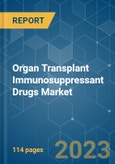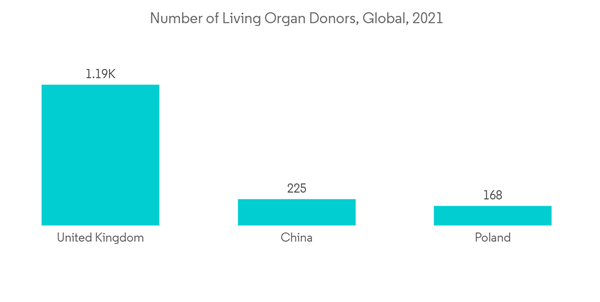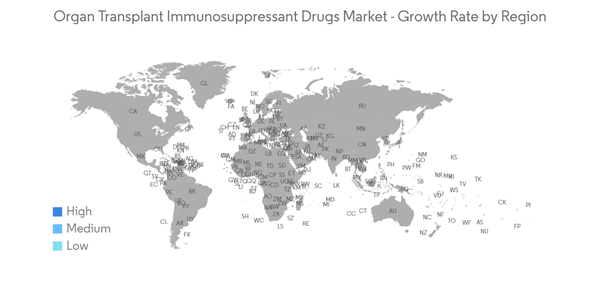COVID-19 significantly impacted the organ transplant immunosuppressant drugs market in the initial phases since many surgeries associated with organ transplantation got delayed along with the shutdown and primary care centers. Due to the delay, there was an enormous increase in the number of transplant candidates on the waiting list, which made the procedure more complicated. However, since the restrictions were eased, the industry has been reviving strongly. Over the previous two years, the market recovery has been driven by an upsurge in increased organ transplantations and new immunosuppressant product launches.
The organ transplant immunosuppressant drugs market is likely to grow over the forecast period because of the rising incidence of chronic diseases and technological advancements in organ transplantation, as these factors can increase the availability of the product in the market, which is anticipated to have a positive impact on the market. For instance, as per the HRSA 2022 update, more than 40,000 transplants were performed in the United States in 2021. As per the same source, there are 105,842 people, including men, women, and children, on the national transplant waiting list. Additionally, government collaborations, the launch of organ transplant centers, and transplantation awareness programs conducted globally are likely to increase market growth as these can expand product availability and improve competition. For instance, in September 2022, an organ transplant center was established in the Middle East, Africa, in Cairo, in cooperation with international companies. This organ transplant center includes an automated database for transplants, patients, and donors. Hence due to such initiatives, high demand for organ transplantation is likely to adopt immunosuppressant drugs as there is an increased chance of immunity reactions when transplantation has occurred. Moreover, in September 2022, the central government of India officially accredited Karnataka’s State Organ Tissue Transplant Organisation (SOTTO) to encourage organ donations in the state. It sanctioned a budget of INR 84 lakh (USD 101 thousand) for the program. As a result, the increased investment in the programs associated with organ donation is likely to drive market growth. Patients with financial issues can also have organ transplantation, boosting the growth of the organ transplant immunosuppressant drugs market.
Furthermore, as per the article published in Frontiers in 2021, solid organ transplantation is the treatment of choice for many patients with end-stage organ dysfunction. As per the analysis, the study demonstrated the effectiveness of Tregs in solid organ transplantation trials by examining their effects on chronic rejection, acute rejection, graft versus host disease, and other associated diseases. Such research conducted in organ transplantation is likely to boost market growth. A heart transplantation surgery is also chosen for people with heart problems who have not progressed sufficiently with drugs or previous operations. According to the 2022 update from Mayo Clinic, survival rates continue to improve despite an increase in older and higher-risk heart transplant recipients. Adults worldwide have a one-year survival rate of nearly 90% and a five-year survival rate of roughly 80%. Additionally, the high prevalence of cystic fibrosis is a major fuelling factor for market growth since a patient with advanced lung diseases along with cystic fibrosis is likely to undergo a lung transplant to improve their quality of life. For instance, according to the CFF 2022 update, there are nearly 40,000 people in the United States with cystic fibrosis. As a result, considering the opportunities for transplantation to improve disease conditions, the market is expected to rise rapidly throughout the forecast period.
Hence, as per the factors mentioned above, the organ transplant immunosuppressant drugs market is anticipated to witness growth over the forecast period. However, the high cost of transplantation and less availability of organs restrain the market growth.
Organ Transplant Immunosuppressant Drugs Market Trends
Calcineurin Inhibitors Segment is Expected to Hold a Major Market Share in the Market Over the Forecast Period
Calcineurin inhibitors are medicines that inhibit the action of calcineurin, an enzyme that activates T-cells of the immune system. These inhibitors exert their effects by reducing interleukin-2 production and receptor expression, reducing T-cell activation. Furthermore, they are essential for immunosuppression in solid organ transplantation. The calcineurin inhibitors segment is likely to witness growth over the forecast period since calcineurin inhibitors help improve the body's immune reactions after organ transplantation and are administered via oral, intravenous, topical, and ophthalmic routes.The calcineurin Inhibitors segment holds a significant market share in the organ transplant immunosuppressant drugs market. It is anticipated to show a similar trend over the forecast period since it is effective and has been used in kidney transplant recipients for a long period. Calcineurin inhibitors (CNIs) represent the foundation of renal transplant immunosuppression. The two medicines comprising this therapeutic class, cyclosporine A (CSA) and tacrolimus (TAC), have been used in kidney transplant recipients for over 20 years. As per the article published in PubMed journal in April 2022, calcineurin inhibitors are safe to administer to patients and do not cause any fatal outcomes in kidney transplant recipients.
Moreover, the rising incidence of kidney failures and liver damage, which is expected to increase the demand for kidney and liver transplantation, and technological advancements in organ transplantations are the key driving factors in the calcineurin inhibitors segment. For instance, as per the IRODAT 2021 report, the number of kidney transplants from living donors was 1,803 in the United States, whereas, in Norway, the transplantation count was 1,237. As per the same source, the number of liver transplants from living donors was 1,632 in Turkey, whereas, in Saudi Arabia, the transplantation count was 1,013.
Hence, the chance of utilizing the immunosuppressant medication after the transplant is likely to increase. Therefore, the market is expected to grow in the calcineurin segment over the forecast period.
North America is Expected to Hold a Significant Share in the Market and Expected to do Same in the Forecast Period
North America is expected to hold a major market share in the global organ transplant immunosuppressant drugs market due to the high number of transplant procedures, the increasing prevalence of chronic ailments requiring organ transplants, and favorable reimbursement policies in this region. For instance, according to the CDC 2022 update, in the United States, the most transplanted organs are the kidney, liver, heart, lungs, pancreas, and intestines. On any given day, there are around 100,000 people on the active waiting list for organs, but only approximately 14,000 deceased organ donors in 2021, with each providing, on average, 3.5 organs. As per the same source in the United States, the most transplanted tissues are bones, tendons, ligaments, skin, heart valves, blood vessels, and corneas. Around 3.3 million tissue grafts were distributed each year. About 2.5 million grafts were transplanted.Furthermore, as per the IRODAT 2021 report, in 2021, the number of organ transplants from living donors in Mexico was 1,158. Hence due to the increase in organ transplantation in Mexico, there is a high chance of taking immunosuppressant medication after the liver transplantation surgery. Therefore, the organ transplant immunosuppressant drugs market is likely to grow in the studied region. Additionally, as per the CIHI report, as of December 31, 2021, 4,043 Canadians were on wait lists to receive a transplant, 57% were active on the waiting list, and 43% were on hold due to a medical or other reason for a short period. According to the same source, for every transplant in Canada in 2021, approximately 1.5 patients were waiting to receive an organ. For each organ-specific transplant that occurred, 2.3 patients were waiting for a pancreas, 1.8 were waiting for a kidney, one was waiting for a heart, and less than one was waiting for a liver or a lung. Hence, the higher rates of organ transplantation in Canada are also driving the market growth in the North American region over the forecast period.
Furthermore, technological advancements in tissue engineering and organ transplantations, increasing healthcare spending, and the presence of well-established healthcare infrastructure are fueling the growth of the overall regional market to a large extent. Additionally, the data updated by the USFDA published in November 2021 showed that there were 4,944 FDA-registered facilities for biologics developments and 6,799 for human drugs. Such a high number of manufacturing facilities to produce drugs is expected to create opportunities for utilizing the organ transplant immunosuppressant drugs market and drive market growth in the studied region.
Hence considering the above-mentioned factors, North America is likely to witness growth over the forecast period.
Organ Transplant Immunosuppressant Drugs Market Competitor Analysis
The organ transplant immunosuppressant drugs market is fragmented, competitive, and consists of several major players. In terms of market share, a few of the major players are currently dominating the market. Some of the companies, which are currently dominating the market, are Astellas Pharma Inc., Sanofi, Bristol-Myers Squibb Company, Novartis AG, F. Hoffmann-La Roche Ltd, GSK PLC, Accord Healthcare Ltd Inc., Dr. Reddy’s Laboratories Ltd, and Veloxis Pharmaceuticals A/S.Additional benefits of purchasing the report:
- The market estimate (ME) sheet in Excel format
- 3 months of analyst support
This product will be delivered within 2 business days.
Table of Contents
Companies Mentioned (Partial List)
A selection of companies mentioned in this report includes, but is not limited to:
- Astellas Pharma Inc.
- Sanofi
- Bristol-Myers Squibb Company
- Novartis AG
- F. Hoffmann-La Roche Ltd
- GSK plc
- Accord Healthcare Ltd
- Viatris
- Dr. Reddy's Laboratories Ltd
- Veloxis Pharmaceuticals A/S










